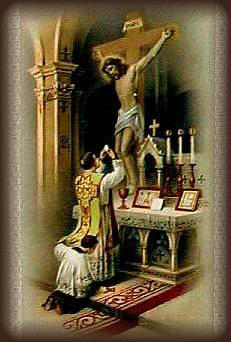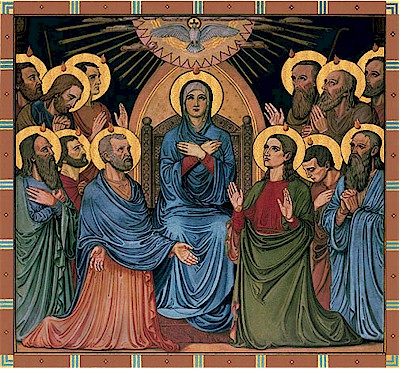Dear Brothers and Sisters,
These words that Jesus spoke at the Last Supper are repeated every time that the Eucharistic Sacrifice is renewed. We have just heard them in Mark's Gospel and they resonate with special power today on the Solemnity of Corpus Christi. They lead us in spirit to the Upper Room, they make us relive the spiritual atmosphere of that night when, celebrating Easter with his followers, the Lord mystically anticipated the sacrifice that was to be consummated the following day on the Cross. The Institution of the Eucharist thus appears to us as an anticipation and acceptance, on Jesus' part, of his death. St Ephrem the Syrian writes on this topic: during the Supper Jesus sacrificed himself; on the Cross he was sacrificed by others (cf. Hymn on the Crucifixion, 3, 1).
"This is my Blood". Here the reference to the sacrificial language of Israel is clear. Jesus presents himself as the true and definitive sacrifice, in which was fulfilled the expiation of sins which, in the Old Testament rites, was never fully completed. This is followed by two other very important remarks. First of all, Jesus Christ says that his Blood "is poured out for many" with a comprehensible reference to the songs of the Servant of God that are found in the Book of Isaiah (cf. ch. 53). With the addition "blood of the Covenant" Jesus also makes clear that through his death the prophesy of the new Covenant is fulfilled, based on the fidelity and infinite love of the Son made man. An alliance that, therefore, is stronger than all humanity's sins. The old Covenant had been sealed on Sinai with a sacrificial rite of animals, as we heard in the First Reading, and the Chosen People, set free from slavery in Egypt, had promised to obey all the commandments given to them by the Lord (cf. Ex 24: 3).
In truth, Israel showed immediately by making the golden calf that it was incapable of staying faithful to this promise and thus to the divine Covenant, which indeed it subsequently violated all too often, adapting to its heart of stone the Law that should have taught it the way of life. However, the Lord did not fail to keep his promise and, through the prophets, sought to recall the inner dimension of the Covenant and announced that he would write a new law upon the hearts of his faithful (cf. Jer 31: 33), transforming them with the gift of the Spirit (cf. Ez 36: 25-27). And it was during the Last Supper that he made this new Covenant with his disciples and humanity, confirming it not with animal sacrifices as had happened in the past, but indeed with his own Blood, which became the "Blood of the New Covenant". Thus he based it on his own obedience, stronger, as I said, than all our sins.
This is clearly highlighted in the Second Reading, taken from the Letter to the Hebrews, in which the sacred author declares that Jesus is the "mediator of a new covenant" (9: 15). He became so through his blood, or, more exactly, through the gift of himself, which gives full value to the outpouring of his blood. On the Cross, Jesus is at the same time victim and priest: a victim worthy of God because he was unblemished, and a High Priest who offers himself, by the power of the Holy Spirit, and intercedes for the whole of humanity. The Cross is therefore a mystery of love and of salvation which cleanses us as the Letter to the Hebrews states from "dead works", that is, from sins, and sanctifies us by engraving the New Covenant upon our hearts. The Eucharist, making present the sacrifice of the Cross, renders us capable of living communion with God faithfully.
Dear brothers and sisters whom I greet with affection, starting with the Cardinal Vicar and the other Cardinals and Bishops present like the Chosen People gathered on Sinai, this evening let us too reaffirm our fidelity to the Lord. A few days ago, in opening the annual Diocesan Convention [of Rome] I recalled the importance of remaining, as Church, attentive to the word of God in prayer and in exploring the Scriptures, especially through the practice of lectio divina, that is, through reading the Bible in meditation and veneration. I know that in this respect many initiatives which enrich our diocesan community have been promoted in parishes, seminaries and religious communities, in confraternities and in apostolic associations and movements. I address my fraternal greeting to the members of this multiplicity of Church bodies. Your numerous presence at this celebration, dear friends, highlights the fact that God moulds our community, characterized by a plurality of cultures and by different experiences. God moulds it as "his" People, as the one Body of Christ, thanks to our heartfelt participation in the twofold banquet of the Word and of the Eucharist. Nourished by Christ, we, his disciples, receive the mission to be "the soul" of this City of ours (cf. Letter to Diognetus, 6: ed. Funk, I, p. 400; see also Lumen Gentium n. 38), a leaven of renewal, bread "broken" for all, especially for those in situations of hardship, poverty or physical and spiritual suffering. Let us become witnesses of his love.
I address you in particular, dear priests, whom Christ has chosen so that with him you may be able to live your life as a sacrifice of praise for the salvation of the world. Only from union with Jesus can you draw that spiritual fruitfulness which generates hope in your pastoral ministry. St Leo the Great recalls that "our participation in the Body and Blood of Christ aspires to nothing other than to become what we receive" (Sermo 12, De Passione 3, 7, PL 54). If this is true for every Christian it is especially true for us priests. To become the Eucharist! May precisely this be our constant desire and commitment, so that the offering of the Body and Blood of the Lord which we make on the altar may be accompanied by the sacrifice of our existence. Every day, we draw from the Body and Blood of the Lord that free, pure love which makes us worthy ministers of Christ and witnesses to his joy. This is what the faithful expect of the priest: that is, the example of an authentic devotion to the Eucharist; they like to see him spend long periods of silence and adoration before Jesus as was the practice of the Holy Curé d'Ars, whom we shall remember in a special way during the upcoming Year for Priests.
St John Mary Vianney liked to tell his parishioners: "Come to communion.... It is true that you are not worthy of it, but you need it" (Bernard Nodet, Le curé d'Ars. Sa pensée - Son coeur, éd. Xavier Mappus, Paris 1995, p. 119). With the knowledge of being inadequate because of sin, but needful of nourishing ourselves with the love that the Lord offers us in the Eucharistic sacrament, let us renew this evening our faith in the Real Presence of Christ in the Eucharist. We must not take this faith for granted! Today we run the risk of secularization creeping into the Church too. It can be translated into formal and empty Eucharistic worship, into celebrations lacking that heartfelt participation that is expressed in veneration and in respect for the liturgy. The temptation to reduce prayer to superficial, hasty moments, letting ourselves be overpowered by earthly activities and concerns, is always strong. When, in a little while, we recite the Our Father, the prayer par excellence, we will say: "Give us this day our daily bread", thinking of course of the bread of each day for us and for all peoples. But this request contains something deeper. The Greek word epioúsios, that we translate as "daily", could also allude to the "super-stantial" bread, the bread "of the world to come". Some Fathers of the Church saw this as a reference to the Eucharist, the bread of eternal life, the new world, that is already given to us in Holy Mass, so that from this moment the future world may begin within us. With the Eucharist, therefore, Heaven comes down to earth, the future of God enters the present and it is as though time were embraced by divine eternity.
Dear brothers and sisters, as happens every year, at the end of Holy Mass the traditional Eucharistic procession will set out and with prayer and hymns we shall raise a unanimous entreaty to the Lord present in the consecrated host. We shall say, on behalf of the entire City: "Stay with us Jesus, make a gift of yourself and give us the bread that nourishes us for eternal life! Free this world from the poison of evil, violence and hatred that pollute consciences, purify it with the power of your merciful love". "And you, Mary, who were the woman "of the Eucharist' throughout your life, help us to walk united towards the heavenly goal, nourished by the Body and Blood of Christ, the eternal Bread of life and medicine of divine immortality". Amen!
POPE BENEDICT XVI
Homily, Corpus Christi Mass and Procession
June 11, 2009











